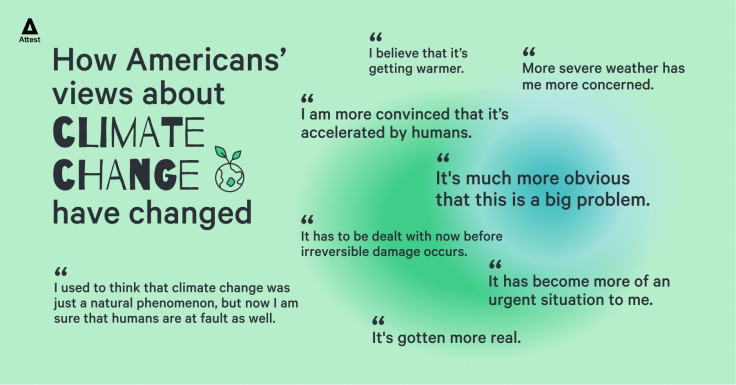A Changing Climate: Seismic Shifts In American Attitudes To Global Warming
The full impact on the American public of the past year in which the U.S. faced a record number of climate-related events is clear. More than nine in 10 Americans are now convinced of the reality of climate change and over one-third believe that it will be an issue that directly affects them within their own lifetime.
Just 6 percent of Americans can be considered climate change deniers, according to data from Attest's 2022 Sustainability Trends report, which surveyed 2,000 U.S. consumers. However, despite the broad consensus that climate change is actually happening, there is still some disagreement about the causes behind it.
Half of the U.S. consumers believe the causes of climate change are part natural, and part human activity. Over a quarter say that human activity is the sole cause, while 15 percent contend that climate change is due to only natural causes. The issue of when the effects of climate change will be felt also divides opinion — 38 percent expect it is going to be in their lifetime, 23 percent think it will be in their children’s lifetime and 20 percent in their grandchildren’s lifetime.
Shifting attitudes to climate change
But it is apparent that there has been a seismic shift in the attitude of the average American towards climate change. Fifty-two percent said their views on climate change had changed in the last year, with one in 10 saying that their view had "changed completely." As mentioned, considering the climate-related events that the U.S. has faced recently — there were 30 named storms, 13 hurricanes, and 58,950 wildfires in 2020 — it's perhaps not all that surprising that there has been such a switch in opinion.

Globally, the number of weather-related disasters has increased five-fold over the past 50 years — and climate change is a big contributing factor. It's a topic that is now rarely out of the headlines. Just recently, the UN's COP26 summit saw climate activists taking to the streets in more than 1,400 locations around the world while international leaders gathered to discuss the current progress — or lack of it — towards a more sustainable future.
From this public groundswell and activism, what's clear is that there is a pressing need for businesses to listen to public opinion and take action to improve their green credentials. More than eight in 10 U.S. consumers said that it was important to them that a company operates and acts in a way that is environmentally friendly. Of these, 51 percent rated this as being “very important” to them.
Sustainability to the fore
Sustainability is now firmly on the public agenda in the US, a fact borne out by the research. Around two-thirds of consumers said they were interested in the issue of sustainability, and awareness of climate issues is growing quickly — when asked the same question in September 2020, 28 percent of people said they were “very interested” in climate change. Now, that figure has increased to 37.5 percent.

With this growing awareness, we also see evidence that more Americans are prepared to take steps to improve their own personal carbon footprints. In 2019, 58 percent said they were consciously trying to reduce their use of single-use plastic, compared to 71 percent in 2021. The number who believed in the need to change our diets to reduce global warming also grew in the same period from 42 percent to 48 percent.
But while sustainability is important, it isn't an absolute priority for most consumers. Indeed, sustainability ranked relatively low when compared with factors like price, quality and convenience in a separate survey of 500 U.S. consumers' buying habits. The fact of the matter is that routine is hard to break, with consumers likely to revert to the more familiar, cheaper, easier option.
What, then, can brands do to encourage consumers to make more sustainable choices? Well, when it comes to selecting products for purchase, 70 percent of respondents said that quality was the most important factor, while 67 percent said that value for money was also a key consideration.
The learning from this is that the most sustainable products also have to be the best quality, highest value for money products too. By matching up these priorities, brands can guide customers to make better choices. This is obviously easier said than done — in fact, sustainable products are rejected by 40 percent of respondents for being too expensive, indicating that there is still some way to go where pricing is concerned. Choice and availability are also areas that brands need to think about, with 35 percent saying they don’t always buy sustainable products because there isn’t a wide enough range to choose from, while 34 percent say they’re not available at their local store.
Authenticity is the key to sustainability
Overall, though, the outlook for businesses that are serious about sustainability is encouraging. Many consumers say they experience positive sentiments when brands promote their environmental credentials, with 42 percent feeling appreciative, 24 percent saying their loyalty toward the company is boosted, and 16 percent feeling assured in their purchase.
It's also clear that environmental concerns are much more of a contributory factor to Americans' purchasing decisions than they were even 12 months ago. Businesses that aren't already prioritising sustainability must react accordingly or they could alienate their existing customer base.
However, efforts to become more sustainable need to be authentic. With nearly two-thirds of consumers saying they would be unlikely to buy from a brand that had embellished its green credentials, businesses have to make sure the changes they make have a genuine impact or risk being accused of "greenwashing." Sustainability initiatives need to be transparent and stand up to scrutiny or the fallout could be highly damaging.
(Jeremy King is the CEO and founder of Attest)
© Copyright IBTimes 2025. All rights reserved.





















